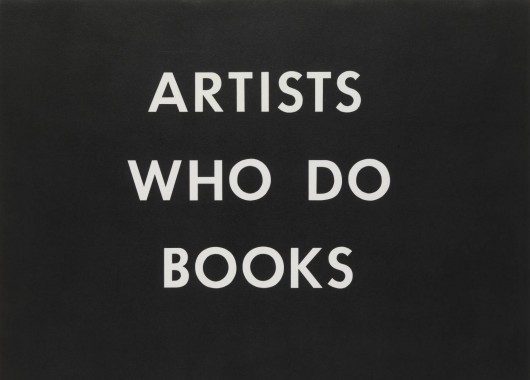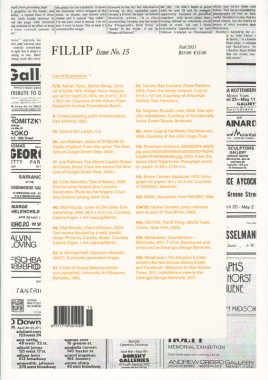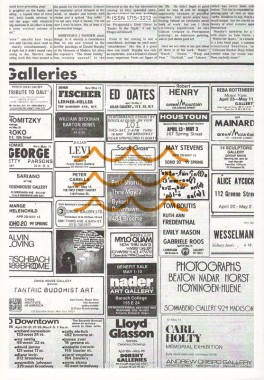Books & Co.
Ed Ruscha — Books & Co.
March 5 — April 27, 2013
Opening: Tuesday, March 5, 6-8pm
Organized by Bob Monk
Gagosian Gallery
980 Madison Ave.
New York, NY 10075
Tuesday-Saturday 10-6pm
Gagosian Gallery is pleased to present an exhibition of Ed Ruscha’s legendary artist books together with books and works of art by more than 100 contemporary artists that respond directly and diversely to Ruscha’s original project. Organized by Bob Monk, “Ed Ruscha Books & Co.” has been drawn from private collections, including Ruscha’s own. Most of the books are installed so that viewers can interact with them and browse their pages.
Inspired by the unassuming books that he found on street stalls during a trip to Europe, in 1962 Ruscha published his first artist book, Twentysix Gasoline Stations under his own imprint, National Excelsior Press. A slim, cheaply produced volume, then priced at $3.50, Twentysix Gasoline Stations did exactly what its title suggests, reproducing twenty-six photographs of gasoline stations next to captions indicating their brand and location. All of the stations were on Route 66, the road mythologized by the eponymous TV series and in John Steinbeck’s The Grapes of Wrath. Ruscha’s book traveled more or less west to east, from the first service station in Los Angeles, where he moved as a young man, back to Oklahoma City, where he grew up.
Initially, the book received a poor reception, rejected by the Library of Congress for its “unorthodox form and supposed lack of information.” However, during the sixties it acquired cult status, and by the eighties it was hailed as one of the first truly modern artist’s books. Ruscha followed up Twentysix Gasoline Stations (1962) with a succession of kindred publications, including Some Los Angeles Apartments (1965), Nine Swimming Pools and a Broken Glass (1968), and Real Estate Opportunities (1970), all of which combined the literalness of early California pop art with a deadpan photographic aesthetic informed by minimalist sequence and seriality.
As the prolific and playful examples in the exhibition attest, Ruscha’s artist books have proved to be deeply influential, beginning with Bruce Nauman’s Burning Small Fires (1968), for which Nauman burned Ruscha’s Various Small Fires and Milk (1964) and photographed the process. More than forty years later, photographer Charles Johnstone relocated Ruscha’s Twentysix Gasoline Stations in Cuba, producing the portfolio Twentysix Havana Gasoline Stations (2008). The most recent homage is One Swimming Pool (2013) by Dutch artist Elisabeth Tonnard, who re-photographed one of the photographs from Ruscha’s Nine Swimming Pools and a Broken Glass (1968) and enlarged it to the size of a small swimming pool, consisting of 3164 pages the same size as the pages in Ruscha’s original book. The pages of this ‘pool on a shelf’ can be detached to create the life-size installation. Between these early and recent examples are a wealth of responses to Ruscha’s ideas by artists from all over the world, gathered here in this celebratory exhibition:
ABC Artists’ Books Cooperative, Noriko Ambe, Edgar Arceneaux, Eric Baskauskas, Luke Batten / Jonathan Sadler (New Catalogue), Erik Benjamins, Victoria Bianchetti, Doro Boehme, Jeff Brouws, Denise Scott Brown, Wendy Burton, Stephen Bush, Corinne Carlson, Dan Colen, Julie Cook, Jennifer Dalton, Bill Daniel, Claudia de la Torre, Joshua Deaner, Jen DeNike, Eric Doeringer, Stan Douglas, Harlan Erskine, Frank Eye, Kota Ezawa, Robbert Flick, Jan Freuchen, Jochen Friedrich, Thomas Galler, Anne-Valérie Gasc, Steve Giasson, Simon Goode, Oliver Griffin, Daniel S. Guy, Dejan Habicht, Marcella Hackbardt, Sebastian Hackenschmidt, Karen Henderson, Mishka Henner, Kai-Olaf Hesse, Taro Hirano, Marla Hlady, Dominik Hruza, Steven Izenour, Sveinn Fannar Jóhannsson, Taly and Russ Johnson, Charles Johnstone, Rinata Kajumova, Henning Kappenberg, Jean Keller, Shohachi Kimura, Julia Kjelgaard, Joachim Koester, Sowon Kwon, Tanja Lažetic, Gabriel Lester, Jonathan Lewis, Jochen Manz, Michael Maranda, Scott McCarney, Mark McEvoy, Jerry McMillan, Daniel Mellis, Martin Möll, Dan Monick, Jonathan Monk, Simon Morris, Audun Mortensen, Brian Murphy, Toby Mussman, Maurizio Nannucci, Bruce Nauman, John O’Brian, Stefan Oláh, Performance Re-Enactment Society, Michalis Pichler, Tadej Pogačar, Susan Porteous, James Prez, Clara Prioux, Robert Pufleb, Joseph Putrock, Jon Rafman, Achim Riechers, David John Russ, Mark Ruwedel, Tom Sachs, Joachim Schmid, Andreas Schmidt, Jean-Frédéric Schnyder, David Schoerner, Yann Sérandour, Travis Shaffer, Gordon Simpson, Paul Soulellis, Tom Sowden, Kim Stringfellow, Derek Stroup, Derek Sullivan, Yoshikazu Suzuki, Chris Svensson, Eric Tabuchi, Elisabeth Tonnard, John Tremblay, Marc Valesella, Wil Van Iersel, Louisa Van Leer, Robert Venturi, Reinhard Voigt, Alex Von Bergen, Emily Wasserman, John Waters, Henry Wessel, Keith Wilson, Charles Woodard, Theo Wujick, Mark Wyse, Hermann Zschiegner.
“Ed Ruscha Books & Co.” will coincide with the publication of MIT Press’s Various Small Books: Referencing Small Books by Ed Ruscha (2013), which documents ninety-one of the books inspired by Ruscha’s own, reproducing covers and sample layouts from each, along with a detailed description. Various Small Books also includes selections from Ruscha’s books and an appendix listing most of the known Ruscha book tributes.
ABC Artists’ Books Cooperative, Achim Riechers, Alex Von Bergen, Andreas Schmidt, Anne-Valérie Gasc, Art, Audun Mortensen, Bill Daniel, Bob Monk, Brian Murphy, Bruce Nauman, Charles Johnstone, Charles Woodard, Chris Svensson, Clara Prioux, Claudia de la Torre, Corinne Carlson, Dan Colen, Dan Monick, Daniel Mellis, Daniel S. Guy, David John Russ, David Schoerner, Dejan Habicht, Denise Scott Brown, Derek Stroup, Derek Sullivan, Dominik Hruza, Doro Boehme, Ed Ruscha, Edgar Arceneaux, Elisabeth Tonnard, Emily Wasserman, Eric Baskauskas, Eric Doeringer, Eric Tabuchi, Erik Benjamins, Frank Eye, Gabriel Lester, Gagosian Gallery, Gordon Simpson, Harlan Erskine, Henning Kappenberg, Henry Wessel, Hermann Zschiegner, James Prez, Jan Freuchen, Jean Keller, Jean-Frédéric Schnyder, Jeff Brouws, Jen DeNike, Jennifer Dalton, Jerry McMillan, Joachim Koester, Joachim Schmid, Jochen Friedrich, Jochen Manz, John O'Brian, John Tremblay, John Waters, Jon Rafman, Jonathan Lewis, Jonathan Monk, Jonathan Sadler, Joseph Putrock, Joshua Deaner, Julia Kjelgaard, Julie Cook, Kai-Olaf Hesse, Karen Henderson, Keith Wilson, Kim Stringfellow, Kota Ezawa, Larry Gagosian, Louisa Van Leer, Luke Batten, Marc Valesella, Marcella Hackbardt, Mark McEvoy, Mark Ruwedel, Mark Wyse, Marla Hlady, Martin Möll, Maurizio Nannucci, Michael Maranda, Michalis Pichler, Mishka Henner, Noriko Ambe, Oliver Griffin, Paul Soulellis, Performance Re-Enactment Society, Reinhard Voigt, Rinata Kajumova, Robbert Flick, Robert Pufleb, Robert Venturi, Scott McCarney, Sebastian Hackenschmidt, Shohachi Kimura, Simon Goode, Simon Morris, Sowon Kwon, Stan Douglas, Stefan Oláh, Stephen Bush, Steve Giasson, Steven Izenour, Susan Porteous, Sveinn Fannar Jóhannsson, Tadej Pogačar, Taly and Russ Johnson, Tanja Lažetic, Taro Hirano, Theo Wujick, Thomas Galler, Toby Mussman, Tom Sachs, Tom Sowden, Travis Shaffer, Victoria Bianchetti, Wendy Burton, Wil Van Iersel, Yann Sérandour, Yoshikazu Suzuki
fillip 15
fillip 15
Softcover, 176 pp., offset 2/1, 170 x 245 mm
Edition of 2500
ISSN 1715-3212
ISBN 978-0-9868326-5-9
Published by Fillip
$15.00 ·
Fillip 15 initiates a new, ongoing series of texts entitled Apparatus, Capture, Trace examining the links between biopolitics and photography. The series opens with essays by Saul Anton on Osama bin Laden and Gabrielle Moser on the work of Jon Rafman, alongside an introduction by series editor Kate Steinmann.
The issue continues essays from the Intangible Economies series, which is the focus of a three-day forum co-organized by Artspeak. Presenting speakers include Melanie Gilligan, Hadley+Maxwell, Candice Hopkins, Olaf Nicolai, Monika Szewczyk, and Jan Verwoert, as well as series editor Antonia Hirsch. The event will be broadcast worldwide on Livestream.
The issue also investigates WikiLeaks: Axis of Reputation, a research-based project by Metahaven produced in conjunction with Fillip 15. Part of Metahaven’s ongoing Transparency, Inc. (2010–), the work interrogates the constantly fluctuating image politics of the online whistleblower Web site WikiLeaks.
1. Christian Hänggi on Stockhausen and 9/11
2. Christian Nagler and Joseph del Pesco on curating and algorithms
3. Chris Fitzpatrick and Post Brothers on parasitical practices
4. Christina Linden on survivalism and sustainability
5. Peta Rake on artist-run initiatives in Brisbane
6. Plus a Criticism Roundtable with Julian Myers, Tara McDowell (the Exhibitionist), and Alexander Provan (Triple Canopy), among others
Alexander Provan, Antonia Hirsch, Art, Artspeak, Candice Hopkins, Christian Hänggi, Christian Nagler, Christina Linden, Distribution, Fillip, Gabrielle Moser, Hadley+Maxwell, Jan Verwoert, Jon Rafman, Joseph del Pesco, Julian Myers, Kate Steinmann, Melanie Gilligan, Metahaven, Monika Szewczyk, Olaf Nicolai, Osama bin Laden, Peta Rake, Politics, Post Brothers, Saul Anton, Tara McDowell, Triple Canopy, WikiLeaks


